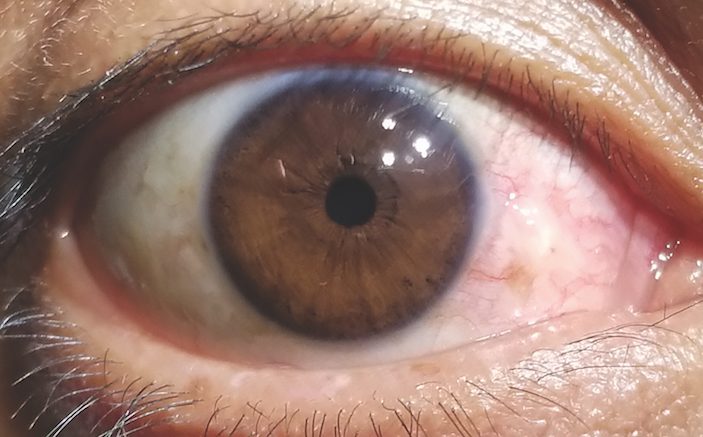An up-close look at a common eye lesion.
A 35-year-old woman presented to the emergency department reporting a three day history of right eye redness and pain. She endorsed constant irritation and redness, and she denied fever, itching, tearing, visual changes, or trauma to the eye. She reported that she had spent the prior week camping in the woods. On examination, the patient had a raised whitish-yellowish lesion on the nasal conjunctiva of her right eye, surrounded by mild erythema (Fig. 1 below). Her visual acuity was 20/20 bilaterally, and no foreign bodies or corneal abrasions were noted on fluorescein exam.
What are you looking at?

Diagnosis: Pingueculitis
A pinguecula is a common degenerative eye lesion, which typically appears as a yellowish to whitish elevated protrusion on the conjunctiva at the 9 or 3 o’clock position. Unlike pterygium, they do not cover the cornea. Prevalence increases with age.
Acute inflammation of a pinguecula results in pingueculitis. Treatment of pingueculitis includes (1) eye protection from sun, wind and dust (which are thought to contribute to pinguecula), (2) artificial tears, and (3) topical steroids, topical NSAIDs, or topical anti-histamines in cases of severe symptoms. Patients treated with steroids should be given prompt ophthalmology follow-up.
The patient was discharged with artificial tears and topical steroids. She followed up in the ophthalmology clinic the next day and reported improvement in her symptoms.
REFERENCES
- Azhar SS. Acute Red Eye. Am Fam Physician. 2007 Sep 15; 76 (6):857-8. http://www.aafp.org/afp/2007/0915/p857.html
- Mimura et al. Severity and Determinants of Pinguecula in a Hospital-Based Population. Eye Contact Lens. 2011 Jan; 37 (1):31-5. doi: 10.1097/ICL.0b013e3181f91f2f.
- Gerstenblith A, Rabinowitz M, “Cornea” in The Wills Eye Manual: Office and Emergency Room Diagnosis and Treatment of Eye Disease. 6th ed.



